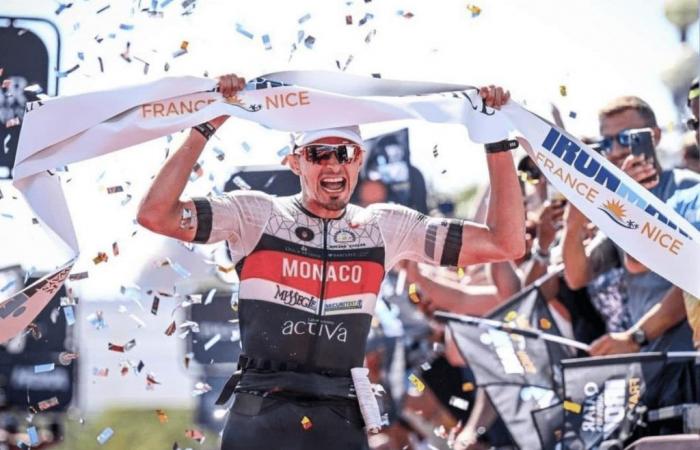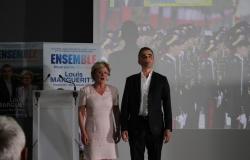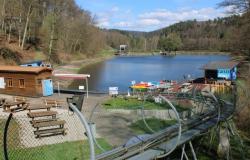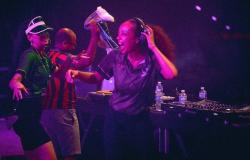June 16, 2024 will remain a date forever engraved for triathlete Steven Galibert, since he won the famous Ironman of Nice hands down. Licensed to AS Monaco Triathlon, he presents us with the keys that opened the doors to victory for him.
On June 16, Steven Galibert experienced one of the most beautiful, if not the most beautiful moment of his career so far: he was the first to cross the finish line out of 4,500 participants. In front of his family, his partner Marine, his friends and the thousands of spectators on the Promenade des Anglais, Steven achieved the feat and won the race in 8 hours, 40 minutes and 14 seconds.
Advertisement
At 32, Steven is a professional swimming instructor and a triathlete by passion. Originally from Tarn, he is licensed in Monaco and therefore represents the Principality during his competitions. Today, we wanted to learn more about this champion. Who is he? How did he train to get there? What was the key to his success? Answers in this interview.
Hello Steven, to start, tell us about your journey in sport so far?
Hello! So I started doing sports when I was little. I played football for 15 years, I’m not a triathlete at all. I discovered cycling with a friend, out of curiosity, then by riding you get a taste for it. You then increase your distances and it’s on the Ironman distance where I can best exploit my qualities. I’ve been doing triathlon for 9 years now.
Triathlon is not necessarily a discipline that you have to practice from a young age. If you find the right keys, you can get there even later. I started around 23-24 years old. I have always had a certain endurance, in football for example, so I am not starting from scratch. So on a long format like the Ironman it can work. On the other hand, on a short format, it is true that these very specific skills are learned relatively early. Like in swimming for example, where I may still have some gaps.
I think that if I manage to have so much fun during my training and my races today, it’s because I arrived late in the discipline and that I always have room to progress.
I admit that if someone had told me 10 years ago that I was going to win an Ironman, I wouldn’t have believed it for a second and I still can’t believe it. Especially in Nice, because it’s a very important competition for a triathlete.
Can you describe a typical day of training for an Ironman?
For training, I have been followed by Karoly Spy for five years now and we have set up a certain routine according to my work schedule. The days don’t necessarily look the same, it’s more the weeks that look the same. Monday for example is a day where I work 9 hours, so it’s a rest day from training. I take the opportunity to take time for myself, to train athletes, which also allows me to learn from others.
Every week I have a big day where I do between 8 and 9 hours of sport with a long bike ride, I go swimming at the lake or in the pool and the rest of the week it’s 4 hours of training per day. In summary, 4 hours five times a week, a big day of 9 hours and a day of rest.
As for nutrition, I took information from a nutritionist to understand my specific needs. On big training days I have to eat well because we tend to skip meals. Otherwise, there is no special diet apart from having a balanced diet with lots of vegetables and proteins.
What was your physical and mental preparation for this Ironman in Nice?
Physically, I started my preparation on January 1, 2024. That’s a total of six months of preparation. I train a little over 25 hours a week, between 25 and 30 hours. I have a job on the side so it’s quite precise in terms of the pace of life.
Mentally, I think you have to take a step back from your events and tell yourself that it’s still sport. You shouldn’t put too much pressure on yourself. Sport should be an added value, an escape. That’s how I see things. At the start of a race, I always tell myself that I did what was necessary in training and if on the day it goes well, so much the better for me and if it goes badly, I have no regrets because I know that I put everything in place to be in the best possible conditions.
What struck you the most during this race?
What I really loved about the race was the bike course. The Nice hinterland is absolutely superb. There are magnificent landscapes. The atmosphere on the Promenade des Anglais also had a huge impact on me. It was crazy. There were really a lot of people.
Over 5 hours of cycling we inevitably have difficult passages so to forget the fact that our legs hurt for 180 kilometers, we chase away the negative. The landscape allows us to forget the difficulty and the pain. I really try to enjoy it as much as possible because we are not all lucky enough to be able to do sport, we must not forget it and nature gives us back the same.
Did you encounter any unexpected events or major obstacles during the race?
Yes, I derailed at the 45th kilometer! I admit that it gives you a little adrenaline rush. It’s an experience, we tell ourselves that anything can happen. We repair, we leave and we forget. Otherwise, I didn’t have a moment of doubt. I always have a moment when I feel much better. Each time on this type of race, it is between the 120th and 130th kilometer. This is where I feel the end of the race is going to go well.
When did you know you were going to win the race?
It took me a moment to tell myself that I was in front and that I was going to win. It’s an effort of over 8 hours. Until the end we tell ourselves that anything can still happen. The machine may stop. It was really hard for me to realize that I was first.
I took first place at the 29th kilometer, but I really believed it only 3 kilometers from the finish. Until I met the second one again, it wasn’t real. When I saw him, I understood that there was a gap between us and that it was almost made for me.
How did you feel when you crossed the finish line?
Firstly I was very surprised. I felt like I was in a tunnel because there were a lot of people. We are stuck in this long finishing straight. What also had a big impact on me was that that day was Father’s Day and the first person I hugged was my dad, upon arrival, wishing him well. party. It’s truly something that will stay with you.
Then I found my girlfriend. There is certainly a banner and a finisher’s medal, but there are also people who deserve to raise the banner just as much as me: my loved ones. Finally, 10 minutes after finishing, I called my coach to thank him.
What do you think is the ultimate key to success in sport?
I am lucky to be well supported by my partner who is totally committed to this project and this is surely the first key to my success. We can train as much as we want, but if we are not well supported we cannot perform as well as I did in this race in Nice.
I also usually say that in training, you should always go progressively. Be very patient. Don’t want to do too much at once, at the risk of injury. You have to work progressively so that the body assimilates all the efforts. I therefore advise a lot of patience and self-confidence. I think that’s what sport should convey.
It was thanks to sport that I gained self-confidence. Winning a race, achieving your goals, you inevitably gain self-confidence. It’s gratifying, we say to ourselves that we worked hard to get there. The pre-race is also very important, you have to try not to think about the race. Be with family if you can, try to release stress with your loved ones. But patience is really the key to success.
Finally, what can we wish you for the future?
Sportingly, I am qualified for the World Championships in Hawaii at the end of October. What you can hope for is to do the same race as in Nice! To give the best possible performance even if it will be a completely different place, with a hot and much more humid climate.
Professionally, I have a relatively stable situation. It’s not necessarily in my plans to change that. My sport doesn’t pay much, if at all. For me, it remains real financial stability but also social connections to keep my job alongside triathlon.






